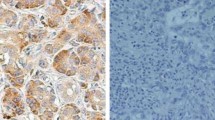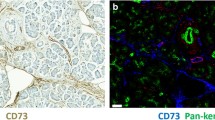Abstract
Receptor-binding cancer antigen expressed on SiSo cells (RCAS1) is a human tumor-associated antigen that induces cell cycle arrest and/or apoptosis in RCAS1 receptor-expressing immune cells. The aim of the present study was to evaluate the clinical significance of RCAS1 expression in human pancreatic adenocarcinoma. Immunohistochemical analysis of RCAS1 expression was performed on paraffin-embedded tissue sections obtained from 76 pancreatic adenocarcinoma patients. RCAS1 positivity and overexpression and intensity of the staining were correlated with clinicopathological parameters, proliferative capacity and patient survival. Of the 76 adenocarcinoma patients, 65 (86%) tested positive for RCAS1; of these 65 RCAS1-positive cases, 36 (55%) showed RCAS1 overexpression. RCAS1 positivity was statistically significantly correlated with the histopathological grade of the tumor (P = 0.026), and it showed a trend to be correlated with tumor size (P = 0.071). RCAS1 intensity and overexpression of staining showed a trend to be correlated with the histopathological grade of the tumor (P = 0.061 and P = 0.089, respectively), whereas RCAS1 positivity and the overexpression and intensity of staining were not statistically significantly correlated with the proliferative capacity of the tumor or any other clinicopathological parameter examined nor with patients’ survival. Our data provide evidence for the implication of RCAS1 in pancreatic neoplasia. However, the prediction of survival using RCAS1 expression as a marker seems uncertain for this type of cancer.

Similar content being viewed by others
References
Nakashima M, Sonoda K, Watanabe T (1999) Inhibition of cell growth and induction of apoptotic cell death by the human tumor-associated antigen RCAS1. Nat Med 5:938–942
Sonoda K, Nakashima M, Kaku M, Kamura T, Nakano H, Watanabe T (1996) A novel tumor-associated antigen expressed in human uterine and ovarian carcinomas. Cancer 77:1501–1509
Yamaguchi K, Enjoji M, Nakashima M, Nakamuta M, Watanabe T, Tanaka M (2005) Novel serum tumor marker, RCAS1, in pancreatic diseases. World J Gastroenterol 11:5199–5202
Matsushima T, Nakashima M, Oshima K, Abe Y, Nishimura J, Nawata H, Watanabe T, Muta K (2001) Receptor binding cancer antigen expressed on SiSo cells, a novel regulator of apoptosis of erythroid progenitor cells. Blood 98:313–321
Akashi T, Oimomi H, Nishiyama K, Nakashima M, Arita Y, Sumii T, Kimura T, Ito T, Nawata H, Watanabe T (2003) Expression and diagnostic evaluation of the human tumor-associated antigen RCAS1 in pancreatic cancer. Pancreas 26:49–55
Kaku T, Sonoda K, Kamura T, Hirakawa T, Sakai K, Amada S, Ogawa S, Kobayashi H, Nakashima M, Watanabe T, Nakano H (1999) The prognostic significance of tumor-associated antigen 22-1-1 expression in adenocarcinoma of the uterine cervix. Clin Cancer Res 5:1449–1453
Takahashi H, Iizuka H, Nakashima M, Wada T, Asano K, Ishida-Yamamoto A, Watanabe T (2001) RCAS1 antigen is highly expressed in extramammary Paget’s disease and in advanced stage squamous cell carcinoma of the skin. J Dermatol Sci 26:140–144
Noguchi K, Enjoji M, Nakamuta M, Nakashima M, Nishi H, Choi I, Taguchi K, Kotoh K, Shimada M, Sugimachi K, Tsuneyoshi M, Nawata H, Watanabe T (2001) Expression of a tumor-associated antigen RCAS1 in hepatocellular carcinoma. Cancer Lett 168:197–202
Oshikiri T, Hida Y, Miyamoto M, Hashida H, Katoh K, Suzuoki M, Nakakubo Y, Hiraoka K, Shinohara T, Itoh T, Kondo S, Katoh H (2001) RCAS1 as a tumor progression marker: an independent negative prognostic factor in gallbladder cancer. Br J Cancer 85:1922–1927
Kubokawa M, Nakashima M, Yao T, Ito KI, Harada N, Nawata H, Watanabe T (2001) Aberrant intracellular localization of RCAS1 is associated with tumor progression of gastric cancer. Int J Oncol 19:695–700
Oizumi M, Nakanishi Y, Yoshino I, Nakashima M, Watanabe T, Hara N (2001) Expression of tumor-associated antigen RCAS1 correlates significantly with poor prognosis in non small cell lung carcinoma. Cancer 92:446–451
Okada K, Nakashima M, Komuta K, Hashimoto S, Okudaira S, Baba N, Hishikawa Y, Koji T, Kanematsu T, Watanabe T (2003) Expression of tumor-associated membrane antigen, RCAS1, in human colorectal carcinomas and possible role in apoptosis of tumor-infiltrating lymphocytes. Mol Pathol 16:679–685
Tsujitani S, Saito H, Honboh T, Ataka M, Tanida T, Makino M, Ikeguchi M (2007) Prognostic significance of receptor-binding cancer antigen expressed on SiSo cells (RCAS1) expression in relation to cadherin expression in patients with colorectal carcinoma. Dis Colon Rectum 50:1241–1249
Popiela TJ, Rudnicka-Sosin L, Dutsch-Wicherek M, Klimek M, Basta P, Galazka K, Wicherek L (2006) The metallothionein and RCAS1 expression analysis in breast cancer tissue regarding the immune cells presence and their activity. Neuro Endocrinol Lett 27:786–794
Tsujitani S, Saito H, Oka S, Sakamoto T, Kanaji S, Tatebe S, Ikeguchi M (2007) Prognostic significance of RCAS1 expression in relation to the infiltration of dendritic cells and lymphocytes in patients with esophageal carcinoma. Dig Dis Sci 52:549–554
Hiraoka K, Hida Y, Miyamoto M, Oshikiri T, Suzuoki M, Nakakubo Y, Shinohara T, Itoh T, Shichinohe T, Kondo S, Kasahara N, Katoh H (2002) High expression of tumor-associated antigen RCAS1 in pancreatic ductal adenocarcinoma in an unfavorable prognostic marker. Int J Cancer 99:418–423
Sonoda K, Miyamoto S, Yotsumoto F, Yagi H, Nakashima M, Watanabe T, Nakano H (2007) Clinical significance of RCAS1 as a biomarker of ovarian cancer. Oncol Rep 17:623–628
Aoe K, Hiraki A, Yamazaki K, Nakamura Y, Murakami T, Maeda T, Nishimura M, Sugi K, Ueoka H (2006) Elevated pleural fluid RCAS1 is a diagnostic marker and outcome predictor in lung cancer patients. Int J Oncol 29:65–72
Jemal A, Siegel E, Ward E, Murray T, Xu J, Smigal C, Thun MJ (2006) Cancer statistics, 2006. CA Cancer J Clin 56:106–130
Evans JD, Morton DG, Neoptolemos JP (1997) Chronic pancreatitis and pancreatic carcinoma. Postgrad Med J 73:543–548
Sarkar FH, Banerjee S, Li Y (2006) Pancreatic cancer: pathogenesis, prevention and treatment. Toxicol Appl Pharmacol (in press) (Epub 11 Nov) [PMID: 17174370]
Miyamoto Y, Maitra A, Ghosh B, Zechner U, Argani P, Iacobuzio-Donahue CA, Sriuranpong V, Iso T, Meszoely IM, Wolfe MS, Hruban RH, Ball DW, Schmid RM, Leach SD (2003) Notch mediates TGF-alpha-induced changes in epithelial differentiation during pancreatic tumorigenesis. Cancer Cell 3:564–576
Smit VT, Boot AJ, Smits AM, Fleuren GJ, Cornelisse CJ, Bos JL (1988) KRAS codon 12 mutations occur very frequently in pancreatic adenocarcinomas. Nucleic Acids Res 16:7773–7783
Schutte M, Hruban RH, Hedrick L, Cho KR, Nadasdy GM, Weinstein CL, Bova GS, Isaacs WB, Cairns P, Nawroz H, Sidransky D, Casero RA Jr, Meltzer PS, Hahn SA, Kern SE (1996) DPC4 gene in various tumor types. Cancer Res 56:2527–2530
American Joint Committee on Cancer (2002) AJCC cancer staging manual, 6th edn. Springer, New York
Enjoji M, Nakashima M, Yamaguchi K, Kotoh K, Nakamuta M (2005) Significance of RCAS1 antigen in hepatocellular, cholangiocellular and pancreatic carcinomas. J Gastroenterol Hepatol 20:1143–1148
Iwasaki T, Nakashima M, Watanabe T, Yamamoto S, Inoue Y, Yamanaka H, Matsumura A, Iuchi K, Mori T, Okada M (2000) Expression and prognostic significance in lung cancer of human tumor-associated antigen RCAS1. Int J Cancer 89:488–493
Sonoda K, Kaku T, Hirakawa T, Kobayashi H, Amada S, Sakai K, Nakashima M, Watanabe T, Nakano H (2000) The clinical significance of tumor-associated antigen RCAS1 expression in the normal, hyperplastic, and malignant uterine endometrium. Gynecol Oncol 79:424–429
Oshikiri T, Miyamoto M, Morita T, Fujita M, Miyasaka Y, Senmaru N, Yamada H, Takahashi T, Horita S, Kondo S (2006) Tumor-associated antigen recognized by the 22-1-1 monoclonal antibody encourages colorectal cancer progression under the scanty CD8+ T cells. Clin Cancer Res 12:411–416
Nakabayashi H, Nakashima M, Hara M, Toyonaga S, Yamada SM, Park KC, Shimizu K (2007) Clinico-pathological significance of RCAS1 expression in gliomas: a potential mechanism of tumor immune escape. Cancer Lett 246:182–189
Sonoda K, Miyamoto S, Hirakawa T, Yagi H, Yotsumoto F, Nakashima M, Watanabe T, Nakano H (2005) Invasive potency related to RCAS1 expression in uterine cervical cancer. Gynecol Oncol 99:189–198
Naito A, Narikiyo M, Yamada Y, Ueno M, Kamada K, Hachisuka T, Yoriki R, Mizuno T, Nakajima Y (2005) A clinical and immunohistochemical study on gastrointestinal mesenchymal (GIMT): RCAS1 as a predictor for recurrence of GIMT. Oncol Rep 14:1127–1132
Ozkan H, Akar T, Koklu S, Coban S (2006) Significance of serum receptor-binding cancer antigen (RCAS1) in pancreatic cancer and benign pancreatobiliary diseases. Pancreatology 6:268–272
Suzuoki M, Hida Y, Miyamoto M, Oshikiri T, Hiraoka K, Nakakubo Y, Shinohara T, Itoh T, Okushiba S, Kondo S, Katoh H (2002) RCAS1 expression as a prognostic factor after curative surgery for extrahepatic bile duct carcinoma. Ann Surg Oncol 9:388–393
Enjoji M, Nakamuta M, Yamaguchi K, Kotoh K, Morizono S, Arimura E, Fukushima M, Kuniyoshi M, Nakashima M, Tanaka M, Nawata H (2004) RCAS1, a useful serum marker to predict the recurrence of cancer: two cases of cholangiocarcinoma and pancreatic cancer. Dig Dis Sci 49:1654–1656
Author information
Authors and Affiliations
Corresponding author
Rights and permissions
About this article
Cite this article
Giaginis, C., Davides, D., Zarros, A. et al. Clinical Significance of Tumor-associated Antigen RCAS1 Expression in Human Pancreatic Ductal Adenocarcinoma. Dig Dis Sci 53, 1728–1734 (2008). https://doi.org/10.1007/s10620-007-0035-7
Received:
Accepted:
Published:
Issue Date:
DOI: https://doi.org/10.1007/s10620-007-0035-7




